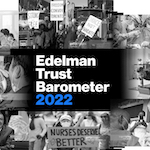 |
Trust plays a major role in consumer decisions about vaccine compliance and preventive care, according to a newly released study from Edelman. The study also finds that the level of confidence in the healthcare system has taken a hit in the wake of the COVID-19 pandemic.
Edelman's "Trust Barometer Special Report on Health" found that more than half (52 percent) of respondents said that the pandemic had lowered their confidence level in healthcare. Also, 55 percent said they are concerned about medical science being too politicized or used to support a specific political agenda.
Globally, the study says that trust in the health sector slid from 73 percent in May 2020 to 62 percent in March 2022.
Trust levels varied considerably over a range of demographics. While 71 percent of respondents with higher incomes said they trust the healthcare system, that number drops to 55 percent for lower-income respondents. That split carried over into urban (66 percent) vs. rural (56 percent), white (62 percent) vs. black (55 percent) or Hispanic (57 percent), and Democrat (70 percent) vs. Republican (60 percent).
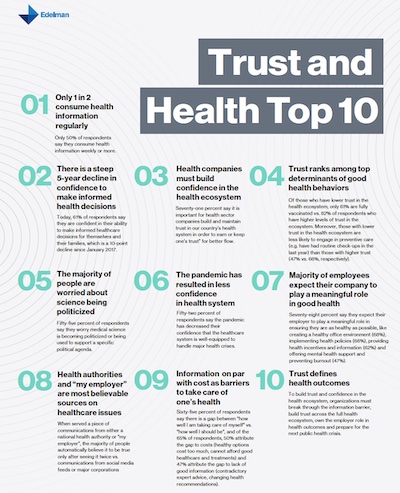 |
Decreasing trust in the healthcare system impacts consumer healthcare choices in several ways, according to the study.
When it comes to choosing whether or not to be vaccinated against COVID-19, people who have a higher level of trust in the sector also said they were more likely to be fully vaccinated. They were also more likely to have had regular check-ups and engaged in preventive care.
A lowered level of trust also results in people being more uncertain of the healthcare decisions they do make. While 61 percent of respondents said they were confident of their ability to make informed decisions for themselves and their families, representing a 10 percent drop from January 2017.
The source where respondents get their healthcare information also impacts their level of trust and their choices. For the fully vaccinated, "my doctor" and "recommendations of national health experts" were the two most relied-upon categories. For those who have chosen to be unvaccinated, "internet searches" and "my friends and family" topped the list.
To break through the trust barrier, Edelman's study proposes several solutions. Where trust in information is low, it suggests using direct, localized and more personal sources. If the problem is a lack of trust in government, other more-trusted institutions need to play a larger role.
The report also says employers need to be more involved in influencing health choices and that health organizations need to address such issues as climate, poverty and racial justice.
Conducted between Feb. 10 and Feb. 18 of this year, the report surveyed 1,000 people in the following 10 countries: the US, France, Canada, Germany, Japan, Nigeria, the UK, South Korea China and Mexico.


 Consumers who once demanded convenience now require consistent, multi-channel experiences that cater to them at every point. Brands must have a clear, audience-appropriate, and channel-specific voice across all platforms.
Consumers who once demanded convenience now require consistent, multi-channel experiences that cater to them at every point. Brands must have a clear, audience-appropriate, and channel-specific voice across all platforms.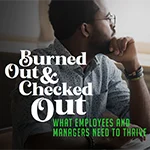 Employees at U.S. companies are experiencing high levels of burnout, but managers are lagging behind when it comes to their awareness of the problem
Employees at U.S. companies are experiencing high levels of burnout, but managers are lagging behind when it comes to their awareness of the problem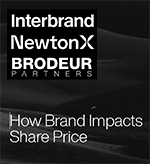 Brand has a powerful effect on a company’s valuation, but the level of brand understanding in the investment community leaves a lot to be desired, according to a new study from Brodeur Partners, Interbrand and NewtonX.
Brand has a powerful effect on a company’s valuation, but the level of brand understanding in the investment community leaves a lot to be desired, according to a new study from Brodeur Partners, Interbrand and NewtonX.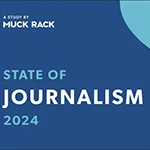 AI may still be viewed with a wary eye by most media pros, but its use is growing, according to a new study from Muck Rack.
AI may still be viewed with a wary eye by most media pros, but its use is growing, according to a new study from Muck Rack.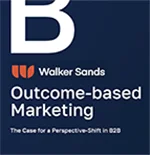 A new study from Walker Sands says that some marketers have been putting the cart before the horse when it comes to the relationship between marketing channels and business outcomes.
A new study from Walker Sands says that some marketers have been putting the cart before the horse when it comes to the relationship between marketing channels and business outcomes.


 Have a comment? Send it to
Have a comment? Send it to 
Mar. 10, 2022, by Joe Honick
Here we go again...we should and could expect the necessary "THEREFORE" from a respectable outfit like Edelman. Unfortunately, the public is hammered by protesting non-medical authorities like truck drivers, right wing idiots like Shapiro, Carlson et al. Edelman is such a fine organization, just reporting the currently obvious without helping to reverse the situation is not acceptable.